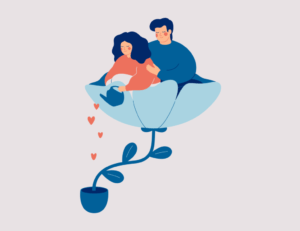Are you stuck in a vicious cycle of doubt and anxiety about your relationship? Do you find yourself constantly questioning the love and commitment of your partner, even when everything seems to be going well? If yes, then it’s time to seek help from a Relationship OCD therapist. In this blog post, we’ll explore why consulting with an expert can be life-changing for those struggling with ROCD. Additionally, we’ll give practical tips on how to find the right therapist who understands the complexity of ROCD and can provide effective treatment.
Contents
What is Relationship OCD?

Obsessive-compulsive disorder (OCD) is an anxiety disorder in which people have unwanted and repeated thoughts, feelings, images, or sensations (obsessions) and engage in behaviors or mental acts (compulsions) in response to these obsessions.
People with relationship OCD (ROCD) obsess about the qualities of their romantic partner or the state of their relationship. They may question whether they are truly in love, worry that their partner is not good enough for them, or doubt their decision to be in the relationship.
As a result, they may engage in compulsive behaviors such as repeatedly asking for reassurance from their partner or analyzing their interactions for “clues” that the relationship is doomed.
ROCD can cause distress and interfere with daily life, but treatment can help. If you think you might have ROCD, talk to a mental health professional who specializes in OCD.
Reasons to Consult a Relationship OCD Therapist

There are many reasons to consult a relationship OCD therapist. If you are struggling with anxiety in your relationship, or if you are having trouble communicating with your partner, a therapist can help.
Some of these reasons to seek help include:
Developing Strategies To Manage Anxiety
One of the main reasons to consult a therapist is to learn strategies for managing the anxiety associated with ROCD. A therapist can help you identify the thoughts and behaviors that are contributing to your distress and develop coping strategies for dealing with them.
These strategies may include cognitive behavioral therapy (CBT), mindfulness practices, or exposure and response prevention (ERP). By working with a therapist, you can learn to manage your anxiety in healthy ways.
Improving Communication In Your Relationship
ROCD can interfere with communication between partners. A relationship OCD therapist can help you identify ineffective patterns of communication and develop healthier, more effective ways of interacting with your partner.
Additionally, a therapist can provide support to help you express yourself clearly and listen actively to your partner. With the help of an experienced therapist, you can learn how to communicate in a productive way that leads to better understanding and connection between you and your partner.
Taking Steps To Resolve Relationship Issues
If your relationship is strained, a therapist can help you take steps toward resolution. A good therapist will help you identify the underlying issues in your relationship and provide guidance on how to address them.
With the support of a therapist, you can work through any conflicts or misunderstandings between you and your partner.
Making Informed Decisions About Your Relationship
A therapist can also help you make informed decisions about your relationship. If you are thinking of ending the relationship, a therapist can provide valuable insight into why this may or may not be a good decision and what kind of support is available to you.
Similarly, if you are considering staying in the relationship, a therapist can help you determine the best way to do so.
Helping Your Partner Understand Your Struggles
If your partner is unaware of your struggles with ROCD, a therapist can help them understand. A therapist can provide education about the condition and offer tips on how to better support you.
By working together, you and your partner can develop a plan for managing relationship anxiety and improving communication in the relationship.
Having a Neutral Space to Express Feelings
Lastly, a therapist provides an objective, neutral space for you and your partner to express your feelings. The therapist can help facilitate productive conversations that lead to deeper understanding and connection between the two of you.
With the guidance of an experienced therapist, you can learn how to communicate healthily so you can better support each other in your relationship.
How to Find a Relationship OCD Therapist?

When it comes to finding a therapist that specializes in Relationship OCD, there are a few things you should keep in mind.
- The first is that not all therapists are created equal and some may not be as qualified or experienced as others. It’s essential to do your research and make sure you’re comfortable with the therapist you choose.
- Another thing to remember is that finding a good relationship OCD therapist can be difficult. So don’t get discouraged if it takes some time. There are several ways to find a qualified therapist, including online directories, word-of-mouth recommendations, and referral services.
- Once you’ve found a few potential therapists, schedule an initial consultation to see if they’re a good fit for you.
- Lastly, don’t forget that the most important part of any therapy is the relationship between you and your therapist. Furthermore, If you don’t feel comfortable with your therapist or don’t feel like they understand your needs, it’s okay to look for someone else.
Ultimately, what matters most is finding a therapist who you can trust and who will help you improve your life.
Conclusion
If you are someone who struggles with relationship OCD, it is important to seek help from a qualified therapist as soon as possible. A relationship OCD therapist can provide invaluable guidance and support in helping you to understand your thoughts, feelings, and behaviors more clearly so that you can make meaningful changes in the way you approach relationships.
To find the right fit for your situation and needs, take some time to research potential therapists in your area or turn to online therapy platforms such as Mantracare if the opportunity presents itself.
For more information and guidance, please contact MantraCare. OCD is a mental health disorder characterized by obsessions and compulsions. If you have any queries regarding Online OCD Counseling experienced therapists at MantraCare can help: Book a trial OCD therapy session


